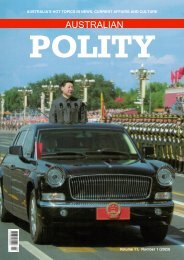Australian Polity, Volume 9 Number 3 - Digital Version
Australia's hot topics in news, current affairs and culture
Australia's hot topics in news, current affairs and culture
Create successful ePaper yourself
Turn your PDF publications into a flip-book with our unique Google optimized e-Paper software.
We live in very challenging times. COVID 19
has fundamentally reshaped the global
landscape. It has triggered the largest
economic shock since the Great Depression. It has
seen the delivery of unprecedented levels of fiscal and
monetary support. It has led to a dramatic change in the
way we live and work, reshaping global supply chains
and accelerating the adoption of new technology. But it
is not just COVID 19 that we must grapple with. Climate
change remains a critical global challenge. One we must
all respond to. And new emerging technologies, such as
AI, robotics and nanotechnology are opening up exciting
new possibilities, but also creating new tensions.
I would like to focus on another key global challenge;
one that is reshaping our external environment and our
domestic policies. I am referring to the return of strategic
competition. Strategic competition is increasingly playing
out in the economic arena, further blurring the lines
between economics, politics and national security. In
many ways, Australia is on the frontline of this new
strategic competition. We have faced increasing pressure
to compromise on our core values. And when we have
stood firm, as we always will, we have been subjected
to economic coercion. As the Prime Minister said at the
USASIA Centre in June “competition does not have to
lead to conflict. . . Nor does competition justify coercion”.
Australia will always choose partnerships ahead of
conflict, wherever we can. However, heightened strategic
competition is the new reality we face. Now and likely
into the future. Our task is to prepare for and manage
this competition. And in this new world, economic
resilience is key: key to our strategic interests and key
to our economic interests. That is why the Morrison
Government is taking strong and active steps to further
strengthen the resilience of our economy. We are doing
this by:
• Building a stronger, more dynamic and competitive
economy.
• By supporting our businesses to diversify and adapt to
this new environment; and, where necessary,
• by securing our critical economic systems and industries.
The return of strategic competition
There can be no doubt that strategic competition is back.
It is a defining feature of the economic and security
landscape we face. Those that advocated ‘The End of
History’ in the early 1990s have been proven wrong. In
March this year, US Secretary of State, Antony Blinken,
said that America’s relationship with China represents
the “biggest geopolitical test of the 21st century” He
further noted that the US relationship with China will be
“competitive when it should be, collaborative when it can
be, and adversarial when it must be”.
This is a very different global environment to that
faced by recent Australian Governments. It is a far cry
from October 2003, when President George Bush and
President Hu Jintao both addressed the Australian
Parliament in successive days.
We have all witnessed the major shifts in global
economic weight over recent decades, defined by the
re-emergence of China and its rapidly growing economic
weight. This has helped to lift more than 800 million
people out of poverty and been a major contributor
to global economic growth and prosperity. But more
recently, it has also been defined by another feature: A
more confident and assertive China; and a China that is
willing to use its economic weight as a source of political
pressure. It offers economic ‘carrots’ through initiatives
such as the Belt and Road; and it threatens economic
consequences for perceived misdeeds. The Australian
Strategic Policy Institute (ASPI) noted recently that China
had used coercive tactics 152 times between 2010 and
2020, against 27 individual countries as well as the EU.
China is also tightening its control over its business
sector, at home and abroad.
We have faced strategic competition before, including
during the Cold War, but there are important differences
this time around - most notably our highly integrated
global economy and trading system. During the Cold
War, the Soviet Union was largely cut off from the rest
of the world. It did not trade or invest much outside of
its sphere of influence. Its investment and trade with the
US were negligible.
Australian Polity 33





